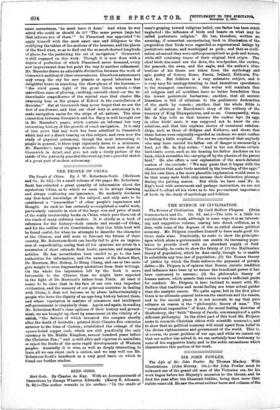THE SCIENCE OF CIVILISATION.
The Science of Civilisation. By Cecil Balfour Phipson. (Swan Sonnenschein and Co. 10s. 6d. net.)—The title is a little too ambitious for this work, although in some ways it is an interest- ing and suggestive volume, coming into direct collision, as it does, with some of the dogmas of the so.called classic political economy. Mr. Phipson considers himself to have made good his three main aims. Practically, he seeks to show the principles upon which alone a government can enable its increasing popu- lation to provide itself with an abundant supply of food. Theoretically, he seeks to show the falsity of (1) the .Malthusian theory of population, which he does easily, though he is unable to substitute any true law of population; (2) the Roman theory of justice by which the State enforces the payment of private debts,—Mr. Phipson is of opinion that Roman juristic tradition and influence have been by no means the beneficent power it has been customary to assume ; (3) the philosophic theory of human nature, which asserts that reason is man's sufficient guide for conduct. Mr. Phipson is here inclined to assert with Mr. Balfour that tradition and moral feeling are truer actual guides than the analytic reason. We quite agree, but in the first place there is no ultimate quarrel between the emotions and the reason, and in the second place it is not accurate to say that pure reliance on reason is the "philosophic theory of man." The "categorical imperative" of Kant, the moral feeling doctrine of Shaftesbury, the" faith" theory of Jacobi, are examples of a quite different philosophy. In the third part of this book Mr. Phipson seeks to reconcile Christian ethics with scientific economics, and to show that no political economy will stand apart from belief in the divine righteousness and government of the world. This is, of course, the great problem of our age, and while we cannot say that our author has solved it, we can certainly bear testimony to some of his suggestive hints, and to the noble earnestness which characterises this portion of his work.






















































 Previous page
Previous page